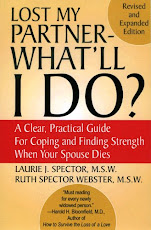
Mental health issues.
According to Dr. Caserta,“Bereavement… is more depressing for many widowers because they, quite simply, have more to lose than widows. This is based on the assumption that a man's spouse is often his primary source of social support.
Consequently, although a widower may have been more apt to express his thoughts and feelings to his wife when she was alive, he may be equally unlikely to be so open to others. Widows more frequently use alternative sources of support that can protect them more effectively from potentially adverse effects of the loss and other stressors.”
The author goes on to say, “Many, however, are not drawn to what they believe to be counseling interventions because they often perceive them as services designed primarily for women. Widowers are typically uncomfortable with environments where the open expression of emotion is encouraged because it is not consistent with their preferred way to grieve.
Instead, researchers and practitioners suggest that bereaved men are more suited to active coping mechanisms that may include being engaged in meaningful activities. Programs that primarily feature such activities could have more appeal to widowers. Group walks and outings, for example, can be just as beneficial as traditional support groups because men who participate are able to interact and support one another in these situations and can do so more comfortably. Because the focus is on activity, however, as opposed to support or counseling itself, it is more consistent with many widowers' coping styles and is consequently less threatening. Because widowers use strategies that tend to be more cognitive than emotional in nature, they do well with books and other educational resources that help them help themselves.

No comments:
Post a Comment